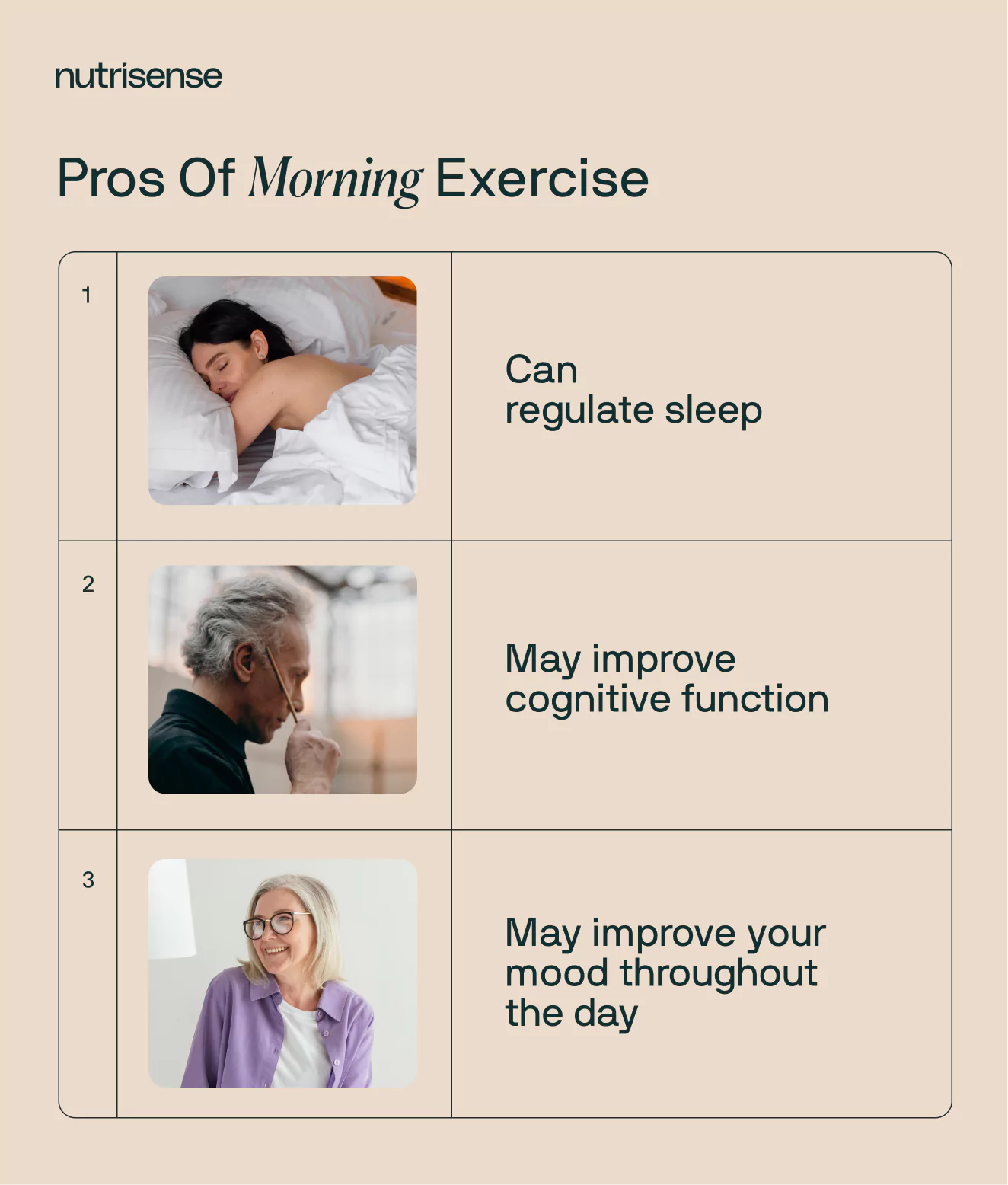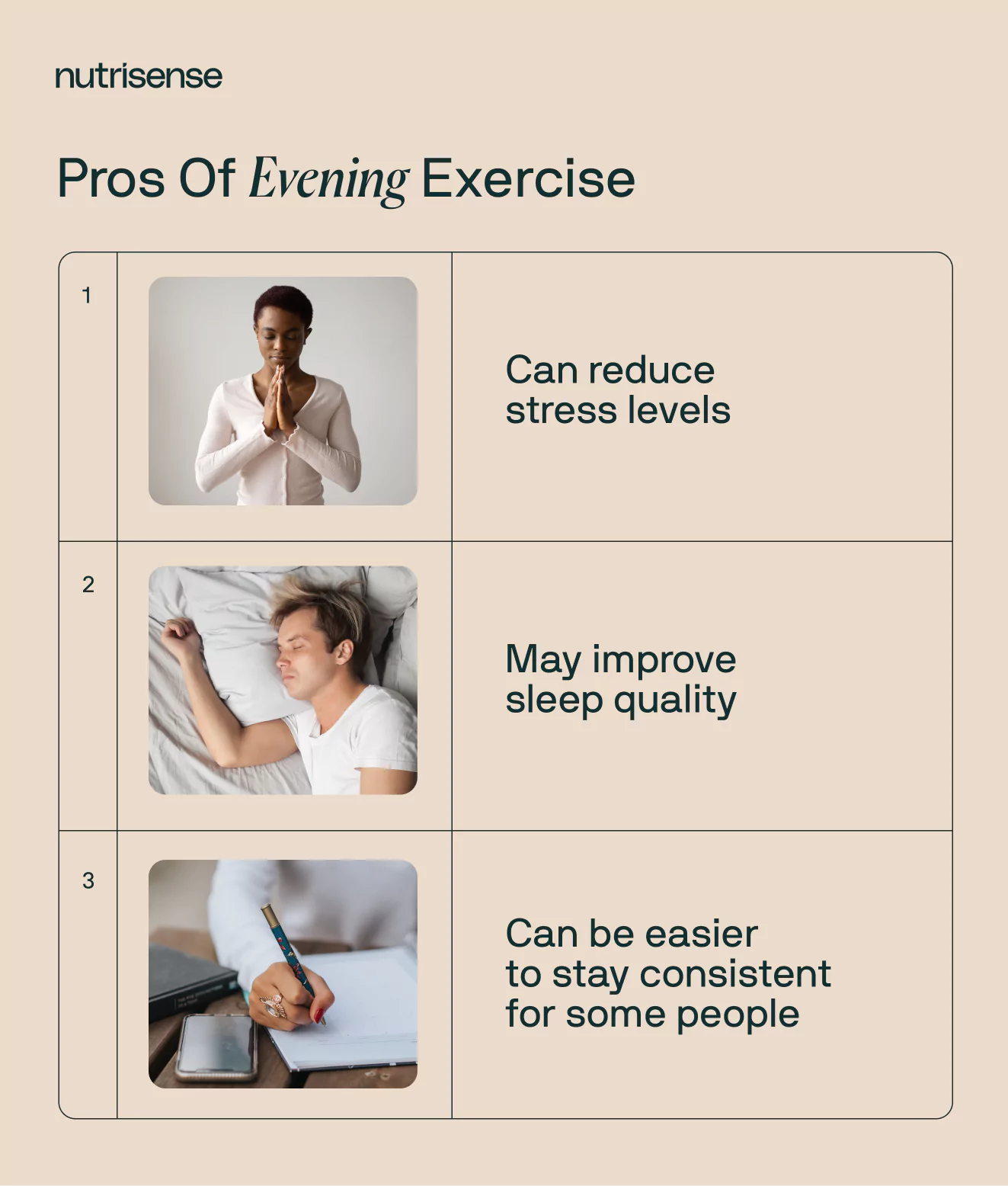Exercise and Training: What is the Best Time of Day for Metabolic Health?

Key Takeaways
Exercise is an important aspect of metabolic health. Getting adequate physical activity can reduce the risk of several chronic diseases, improve insulin sensitivity, increase energy, and generally improve metabolic function in many ways.
But is there a certain time of day that can help maximize the health benefits of exercise? In this article, we'll explore the best time of day to exercise for metabolic health and consider the pros and cons of morning versus evening workouts.
What is the Difference Between Metabolism and Metabolic Health?

While metabolism and metabolic health are closely related, they are not the same thing. Metabolism refers to all of the chemical reactions that occur within the body to keep you alive.
Metabolic health, on the other hand, typically refers to the status of the body’s metabolic processes and how they impact your overall health and wellbeing.
Metabolic health encompasses many different factors, including:
- Insulin sensitivity and blood sugar regulation
- Body weight
- Cholesterol levels
- Hormone balance
- Symptoms such as energy, mood, sleep, and digestive function
According to researchers, good metabolic health is partly defined by a lack of symptoms or conditions that contribute to metabolic syndrome, which include high blood pressure, high cholesterol, imbalanced blood sugar, and a large waistline or abdominal obesity. These factors can raise your risk for serious health conditions, like type 2 diabetes and cardiovascular disease.
What is the Connection Between Metabolic Health and Exercise?

Metabolic health and exercise are intimately connected. Regular physical activity can contribute to metabolic health by boosting insulin sensitivity, increasing energy expenditure, and promoting weight loss.
Exercise also helps build lean muscle mass, which is important for maintaining a healthy metabolic rate. A sedentary lifestyle, on the other hand, can negatively impact metabolic health, leading to an increased risk of:
- Weight gain
- Insulin resistance
- High cholesterol
- Type 2 diabetes
- Heart disease
- Certain types of cancer
More exercise does not necessarily equate to better metabolic health, however. In fact, over-exercising may have similarly negative effects on metabolic health to a sedentary lifestyle.
It’s also important to remember that everyone’s body is different. What is “optimal” for one person may be too much or too little for another person. Talk to your doctor, physical therapist, licensed nutritionist, or a certified personal trainer to better understand how much exercise is right for you.
Reducing Risk for Diabetes

Exercise has been shown to help the body manage glucose levels and maintain insulin sensitivity, which are important aspects of metabolic health that reduce the risk of developing diabetes. Exercise may also help with weight management and reduce chronic inflammation, two factors that may also reduce the risk of type 2 diabetes.
Reducing Risk for Cardiovascular Disease
Exercise can reduce the risk of heart disease by promoting healthy cholesterol levels. Regular physical activity has been shown to increase HDL cholesterol and reduce levels of triglycerides.
Exercise also promotes healthy blood pressure levels, a major risk factor for heart disease.
Reducing Risk for Obesity

Exercising regularly can play an important role in reducing the risk of obesity. Cardio exercise helps the body burn calories, which may support weight loss. Strength training exercises can also increase your muscle mass, which has been linked to weight loss and can increase your resting metabolic rate.
How Does Exercise Help with Insulin Sensitivity?

As mentioned earlier, regular exercise can improve insulin sensitivity, which is the body's ability to respond to insulin and regulate blood sugar levels. During exercise, your muscles use glucose as fuel and require insulin to make use of the glucose in your blood.
With regular exercise, the muscles become more sensitive to insulin, which means they require less insulin to uptake glucose from the blood. This can eventually lead to lower blood sugar levels.
Additionally, exercise can help with weight loss and a reduction in body fat, which is a major risk factor for insulin resistance and type 2 diabetes.
Does the Time of Day Affect Your Metabolic Health?
Interesting, the time of day actually does have an impact on your metabolic health. This is because our circadian rhythm, which regulates many of our body’s functions, is closely linked to our metabolism.
Circadian Rhythm

Circadian rhythms are physical, mental, and behavioral changes that occur during a 24-hour cycle. Also called the body's internal clock, circadian rhythms regulate many physiological processes that impact metabolism.
This includes the production of hormones like insulin, cortisol, and melatonin, which play a crucial role in regulating energy metabolism. The circadian rhythm also impacts our eating habits, blood sugar levels, sleep cycle, digestion, and body temperature, which have an effect on metabolic health.
Blood Sugar Regulation
Blood sugar regulation is also closely linked to the time of day and our circadian rhythm. For example, our bodies produce hormones in the morning that trigger the production of glucose in the liver, which provides the energy that helps us wake up.
The time of day can also influence our body’s response to insulin, our oral glucose tolerance, and our ability to make use of glucose. Disruptions in the circadian rhythm, caused by poor sleep habits or working a night shift, can also disrupt glucose homeostasis and increase the risk of metabolic disease.
Is Working Out in the Morning or at Night More Effective?

Whether working out at different times of the day is more effective or not can depend on what you hope to gain from exercising. Some research shows that morning exercise is more effective at reducing blood pressure and abdominal fat in women.
Animal studies have also suggested that time of day does have an effect on post-exercise metabolism, with more efficiency after a morning workout. Late afternoon or evening exercise, on the other hand, is shown to be more effective at increasing muscular performance in women and reducing blood pressure in men.
Research also shows that our muscle strength may increase throughout the day, with the greatest isometric strength occurring in the afternoon. It’s important to note, however, that our body’s response to exercise can depend on factors other than time of day.
What and how we eat before exercising is also important. Often, the benefit of exercise is only as good as our nutritional foundation, which supports our body's ability to adapt to the stress of exercise.
If you are under-fueling or improperly fueling for your workouts, it's much more likely you will experience negative effects from exercising. Proper fueling for exercise, including considering the role of protein and carbohydrates, helps your body maintain proper blood glucose concentration and improves recovery time.
The effects of exercise can also depend on stressors or even any medical conditions we may have. Exercising more when you are fighting off an infection or recovering from an injury can suppress the immune system, whereas moderate exercise after sickness or injury may reduce inflammation and improve health outcomes.
Morning Workouts: Pros and Cons

There are several pros and cons to early morning exercise to consider when structuring the best workout plan for your needs.
Pros
- Morning exercise has been shown to help regulate the body's sleep-related hormonal responses, sleep habits, and quality of sleep.
- Research shows that morning exercise may improve working memory and executive function.
Cons
- Working out in the morning before eating may have negative effects on the body and be less effective for weight loss.
- Older people with hypertension may experience a morning surge in high blood pressure. If you have hypertension, talk to your doctor before exercising.
- Morning workouts may require you to wake up earlier in the morning, cutting into valuable sleep time, which may not be feasible for everyone's schedule.
Evening Workouts: Pros and Cons

There are also pros and cons to evening or afternoon exercise, including:
Pros
- Moderate-intensity exercise in the evening may improve sleep quality.
- Some people may have more energy and motivation to exercise later in the day, making it easier to maintain a consistent workout routine.
- Exercise can help reduce stress levels, so working out in the evening may be a beneficial way to wind down after a long day.
Cons
- For some people, vigorous exercising in the early evening or too close to bedtime can disrupt sleep.
- Research shows that people may be more likely to stick to a consistent workout schedule that takes place in the morning.
What Time of Day Should You Work Out for Best Results?

When it comes to the effectiveness of working out in the morning or at night, there is no one-size-fits-all answer. Consistency and adherence to a workout routine are more important than the specific time of day that you exercise.
It’s important to experiment and find what works best for you. Monitoring your specific symptoms of stress load throughout the day, including energy levels, sleep quality, and mood, can help you gauge your exercise tolerance.
Ultimately, the best time of day to work out is the time that works best for you and fits into your schedule. By consistently engaging in physical activity at a time that works for you, you can help support metabolic health and overall fitness.
Find the right Nutrisense programto turn insight into progress.
Go Beyond Glucose Data with Nutrisense
Your glucose can significantly impact how your body feels and functions. That’s why stable levels are an important factor in supporting overall wellbeing. But viewing glucose isn't enough. Nutrisense, you’ll be able to learn how to use your body's data to make informed lifestyle choices that support healthy living.
One-to-one coaching
Sign up to access insurance-covered video calls to work with a glucose expert: a personal registered dietitian or certified nutritionist who will help tailor your lifestyle and diet to your goals.
Monitor and measure what matters
With the Nutrisense CGM Program, you can monitor your glucose with health tech like glucose biosensors and continuous glucose monitor (CGM)s, and analyze the trends over time with the Nutrisense App. This will help you make the most informed choices about the foods you consume and their impact on your health.
Find your best fit
Ready to take the first step? Start with our quiz to find the right Nutrisense program to help you take control.

Heather is a Registered and Licensed Dietitian Nutritionist (RDN, LDN), subject matter expert, and technical writer, with a master's degree in nutrition science from Bastyr University. She has a specialty in neuroendocrinology and has been working in the field of nutrition—including nutrition research, education, medical writing, and clinical integrative and functional nutrition—for over 15 years.




